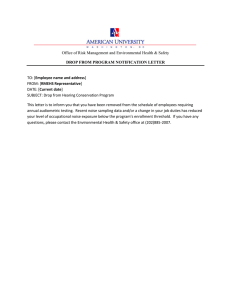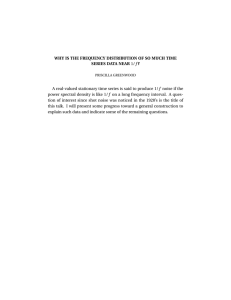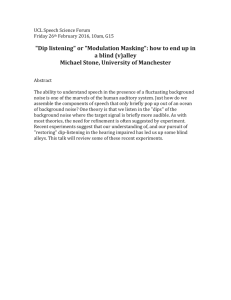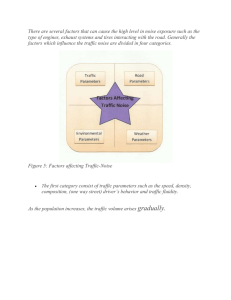High Frequency Noise - For Your Information
advertisement
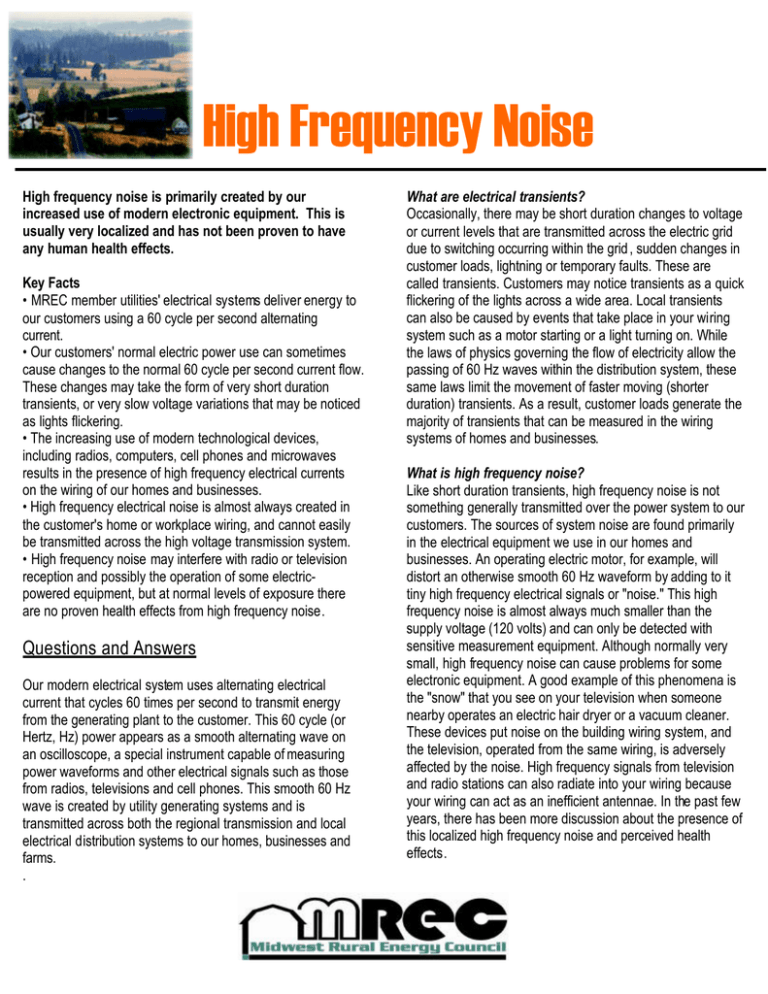
High Frequency Noise High frequency noise is primarily created by our increased use of modern electronic equipment. This is usually very localized and has not been proven to have any human health effects. Key Facts • MREC member utilities' electrical systems deliver energy to our customers using a 60 cycle per second alternating current. • Our customers' normal electric power use can sometimes cause changes to the normal 60 cycle per second current flow. These changes may take the form of very short duration transients, or very slow voltage variations that may be noticed as lights flickering. • The increasing use of modern technological devices, including radios, computers, cell phones and microwaves results in the presence of high frequency electrical currents on the wiring of our homes and businesses. • High frequency electrical noise is almost always created in the customer's home or workplace wiring, and cannot easily be transmitted across the high voltage transmission system. • High frequency noise may interfere with radio or television reception and possibly the operation of some electricpowered equipment, but at normal levels of exposure there are no proven health effects from high frequency noise . Questions and Answers Our modern electrical system uses alternating electrical current that cycles 60 times per second to transmit energy from the generating plant to the customer. This 60 cycle (or Hertz, Hz) power appears as a smooth alternating wave on an oscilloscope, a special instrument capable of measuring power waveforms and other electrical signals such as those from radios, televisions and cell phones. This smooth 60 Hz wave is created by utility generating systems and is transmitted across both the regional transmission and local electrical distribution systems to our homes, businesses and farms. . What are electrical transients? Occasionally, there may be short duration changes to voltage or current levels that are transmitted across the electric grid due to switching occurring within the grid , sudden changes in customer loads, lightning or temporary faults. These are called transients. Customers may notice transients as a quick flickering of the lights across a wide area. Local transients can also be caused by events that take place in your wi ring system such as a motor starting or a light turning on. While the laws of physics governing the flow of electricity allow the passing of 60 Hz waves within the distribution system, these same laws limit the movement of faster moving (shorter duration) transients. As a result, customer loads generate the majority of transients that can be measured in the wiring systems of homes and businesses. What is high frequency noise? Like short duration transients, high frequency noise is not something generally transmitted over the power system to our customers. The sources of system noise are found primarily in the electrical equipment we use in our homes and businesses. An operating electric motor, for example, will distort an otherwise smooth 60 Hz waveform by adding to it tiny high frequency electrical signals or "noise." This high frequency noise is almost always much smaller than the supply voltage (120 volts) and can only be detected with sensitive measurement equipment. Although normally very small, high frequency noise can cause problems for some electronic equipment. A good example of this phenomena is the "snow" that you see on your television when someone nearby operates an electric hair dryer or a vacuum cleaner. These devices put noise on the building wiring system, and the television, operated from the same wiring, is adversely affected by the noise. High frequency signals from television and radio stations can also radiate into your wiring because your wiring can act as an inefficient antennae. In the past few years, there has been more discussion about the presence of this localized high frequency noise and perceived health effects. What is the consequence of this high frequency noise? As we have all seen on our television screens or heard on our AM radios, these high frequency signals can be detected and can interfere with radio and television reception, and possibly cause the miss-operation of other equipment. Are there any health effects of high frequency noise? No medical research links localized high frequency noise, the kind we encounter during the normal course of our lives, with any health effects. Consequently, claims linking high frequency noise with a variety of illnesses ranging from anxiety attacks to chronic fatigue syndrome are unprove n. Can I buy any devices that remove high frequency noise? MREC member utilities are aware of equipment that claims to remove high frequency noise or to “send it back” to the utility. Unfortunately, these devices do not eliminate the source of the high frequency signal, and the laws of physics do not allow a high frequency signal generated by customer equipment to be transmitted back to MREC utilities. More importantly, use of these devices may create unsafe conditions if they have not been approved for use by an independent testing agency such as Underwriter's Laboratory (UL). MREC member utilities do not offer any devices for sale, nor do we endorse any product or its use . What are MREC member utilities doing about high frequency noise? First, we are attempting to educate our customers about the source of high frequency noise. We are also supporting research to increase our understanding of its causes and how to minimize its potential effect on sensitive electronic equipment. MREC member utilities continue to support research for improving the efficiency and maintaining the safety of our distribution system. All electric distribution system upgrades follow both Public Service Commission of Wisconsin and National Electrical Safety Code requirements. Finally, we provide guidance to customers who have questions or concerns about transients and high frequency noise . How can I obtain more information? If you have specific questions about high frequency noise, contact your electric utilities directly or visit our website at www.mrec.org . What is the MREC? The MREC is a membership organization of energy suppliers, energy service professionals and Land Grant Universities whose mission is to support outreach, education and research on rural energy issues for the benefit of: • Farms and other rural energy consumers • Rural energy suppliers • Farm organizations and agricultural trade associations • Electrical equipment and allied industries • Government and regulatory agencies
